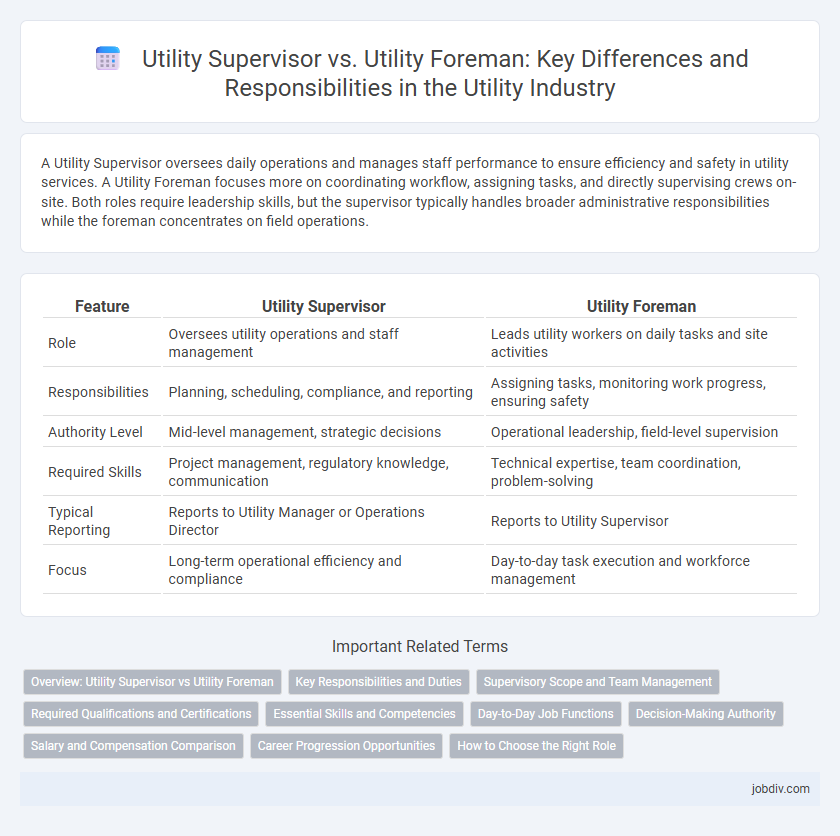A Utility Supervisor oversees daily operations and manages staff performance to ensure efficiency and safety in utility services. A Utility Foreman focuses more on coordinating workflow, assigning tasks, and directly supervising crews on-site. Both roles require leadership skills, but the supervisor typically handles broader administrative responsibilities while the foreman concentrates on field operations.
Table of Comparison
| Feature | Utility Supervisor | Utility Foreman |
|---|---|---|
| Role | Oversees utility operations and staff management | Leads utility workers on daily tasks and site activities |
| Responsibilities | Planning, scheduling, compliance, and reporting | Assigning tasks, monitoring work progress, ensuring safety |
| Authority Level | Mid-level management, strategic decisions | Operational leadership, field-level supervision |
| Required Skills | Project management, regulatory knowledge, communication | Technical expertise, team coordination, problem-solving |
| Typical Reporting | Reports to Utility Manager or Operations Director | Reports to Utility Supervisor |
| Focus | Long-term operational efficiency and compliance | Day-to-day task execution and workforce management |
Overview: Utility Supervisor vs Utility Foreman
A Utility Supervisor oversees daily operations, manages team performance, and ensures compliance with safety regulations in utility services. A Utility Foreman primarily directs field crews, coordinates tasks on-site, and enforces work schedules to maintain project efficiency. Both roles require strong leadership skills but differ in scope, with supervisors focusing on strategic oversight and foremen concentrating on tactical execution.
Key Responsibilities and Duties
Utility Supervisors oversee the daily operations of utility services, ensuring compliance with safety regulations, managing staff schedules, and coordinating maintenance activities. Utility Foremen primarily lead field crews during installation, repair, and maintenance tasks, directing on-site work and enforcing adherence to technical specifications. Both roles require strong leadership skills, but supervisors focus more on administrative duties while foremen emphasize hands-on team coordination.
Supervisory Scope and Team Management
Utility Supervisors oversee multiple utility operations, coordinating several teams to ensure compliance with safety standards and efficient workflow. Utility Foremen manage day-to-day activities within a single team, directly supervising workforce tasks and addressing on-site issues. The supervisor's role emphasizes strategic planning and inter-team communication, while the foreman focuses on hands-on leadership and immediate task execution.
Required Qualifications and Certifications
Utility Supervisors typically require a high school diploma or equivalent, with many employers preferring some college coursework or an associate degree in utility management or a related field. Certifications such as OSHA safety training, Certified Utility Management (CUM), or specific state utility operator licenses are commonly required to ensure compliance and enhance supervisory skills. Utility Foremen often need similar educational backgrounds but must have extensive hands-on experience and may be required to hold specialized certifications like Commercial Driver's License (CDL) or trade-specific licenses to manage field operations effectively.
Essential Skills and Competencies
Utility Supervisors demonstrate strong leadership skills, overseeing daily operations and ensuring compliance with safety regulations, while Utility Foremen excel in hands-on technical expertise and crew management on-site. Both roles require proficiency in problem-solving, communication, and knowledge of utility systems, but Supervisors emphasize strategic planning and coordination, whereas Foremen focus on task execution and real-time troubleshooting. Effective decision-making, equipment knowledge, and the ability to train and mentor utility workers are crucial competencies shared by both positions.
Day-to-Day Job Functions
Utility Supervisors oversee daily operations, manage staff assignments, and ensure compliance with safety regulations across utility departments. Utility Foremen directly supervise work crews, coordinate maintenance tasks, and monitor equipment functionality to maintain uninterrupted service delivery. Both roles prioritize efficient workflow, but supervisors focus more on strategic planning while foremen handle hands-on personnel guidance.
Decision-Making Authority
Utility Supervisors hold greater decision-making authority compared to Utility Foremen, as they oversee broader operational strategies and resource allocation across multiple teams. Utility Foremen primarily focus on directing day-to-day field activities and ensuring project tasks are completed efficiently under the guidance of supervisors. The supervisor's role involves higher-level judgment calls related to safety compliance, personnel management, and emergency response coordination within utility services.
Salary and Compensation Comparison
Utility Supervisors typically earn higher salaries than Utility Foremen, with median annual wages around $70,000 compared to $55,000 respectively. Compensation packages for Utility Supervisors often include bonuses, overtime pay, and comprehensive benefits such as health insurance and retirement plans. Salary variations depend on factors like geographic location, years of experience, and the size of the utility company.
Career Progression Opportunities
Utility Supervisor roles typically offer broader career progression opportunities compared to Utility Foreman positions, as supervisors manage multiple teams and are involved in strategic planning and compliance oversight. Utility Foremen focus on direct team leadership and daily operational tasks, serving as a critical step toward supervisory roles but with more limited advancement potential. Advancing from Foreman to Supervisor often requires enhanced skills in project management, regulatory knowledge, and leadership, opening paths to higher management roles within utility companies.
How to Choose the Right Role
Choosing between a Utility Supervisor and a Utility Foreman depends on the scope of responsibilities and leadership level within utility operations. A Utility Supervisor typically oversees multiple teams and ensures regulatory compliance and overall project coordination, while a Utility Foreman manages daily tasks and directs crew members on-site. Assessing career goals, leadership skills, and interest in administrative versus hands-on management helps determine the ideal role for professional growth in the utility sector.
Utility Supervisor vs Utility Foreman Infographic

 jobdiv.com
jobdiv.com